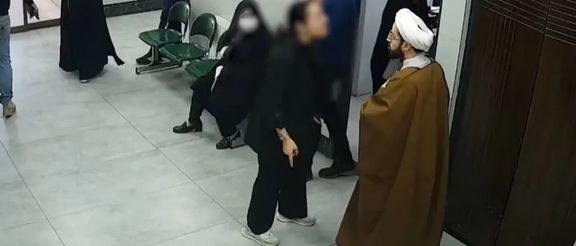Some Clerics In Iran Criticize Zealous Hijab Enforcement

Several Iranian clerics have criticized hardline policies regarding compulsory hijab, after public outcry over a clergyman filming a young mother who was not wearing a headscarf.

Several Iranian clerics have criticized hardline policies regarding compulsory hijab, after public outcry over a clergyman filming a young mother who was not wearing a headscarf.
The video, exclusively sent to Iran International last week, captured a tense exchange between the young woman and the cleric who was filming her while she held her baby with a loosely worn hijab in a clinic in Qom, a religious city. Hardliner hijab enforcers collect evidence of women not wearing hijab for possible police action and prosecution.
The incident sparked widespread reactions on social media, with many Iranians condemning the video as evidence of the oppressive nature of the Islamic Republic and its strict hijab laws.
In an unusual move, a Friday Prayers Imam in Iran publicly has criticized the actions of the cleric in Qom, condemning the practice of photographing or intimidating women without compulsory hijab and challenging the notion that all those who do not conform to hijab laws are morally corrupt.
The Friday Prayers Imam of Ilam, Shamsollah Seraj, also called for a revision of Iran's new hijab bill, expressing concerns that its implementation would lead to societal problems. The bill, titled "Protection of Family Through Promotion of Hijab and Chastity Culture," has already gained parliamentary approval and awaits validation by the Guardian Council.
“If you see a woman [without compulsory hijab] and you take a picture or pretend to take a picture, this is wrong,” said Shamsollah Seraj, arguing that “It is not acceptable to think that all those who do not conform to compulsory hijab are promiscuous and corrupt.”
The enforcement strategy in the bill includes surveillance measures such as facial recognition technology and scrutiny of online content to identify violators. Earlier in the month, lawmaker Amir-Hossein Bankipour, announced that according to the bill, fines for women who do not comply with hijab laws will be directly deducted from their bank accounts, without the need for their permission.
Meanwhile, former lawmaker Ahmad Mazani, himself a clergyman, cautioned against harsh measures adopted by government agencies, police forces, and basij militias to monitor and control people's behavior. He emphasized the importance of teaching clerics how to treat people with compassion, especially in healthcare settings like the Qom clinic incident.
In an article published in Etemad daily on Saturday, Mazani wrote in reference to the Qom clinic incident: “The seminaries should not allow clerics to be demoted to the role of officers of some [governmental] institutions and should instead teach them how to treat people. Healthcare facilities are frequented by patients and their companions who might at times be perturbed due to the challenges of the illness. A woman who is breastfeeding her child needs love and respect the most.”
The negative reactions among clerics highlight divisions within conservative circles regarding the hardline policies of the Iranian government. Senior cleric Mohammad-Taghi Fazel Meibodi condemned the behavior of the cleric in the clinic, stating that such conduct is inappropriate for someone in clerical attire.
Meibodi stressed the need to de-escalate tensions, warning that incidents like these could fuel civil protests, referencing the recent public discontent following the death of Mahsa Amini, who died in morality-police custody after her arrest for improper hijab in 2022, sparking the Woman, Life, Freedom movement across Iran.
Armita Geravand, a sixteen-year-old girl, became one of the latest victims of Iran's repressive hijab policy when she died on October 28 after sustaining brain damage during a violent encounter with hijab enforcers at Tehran’s subway stations.